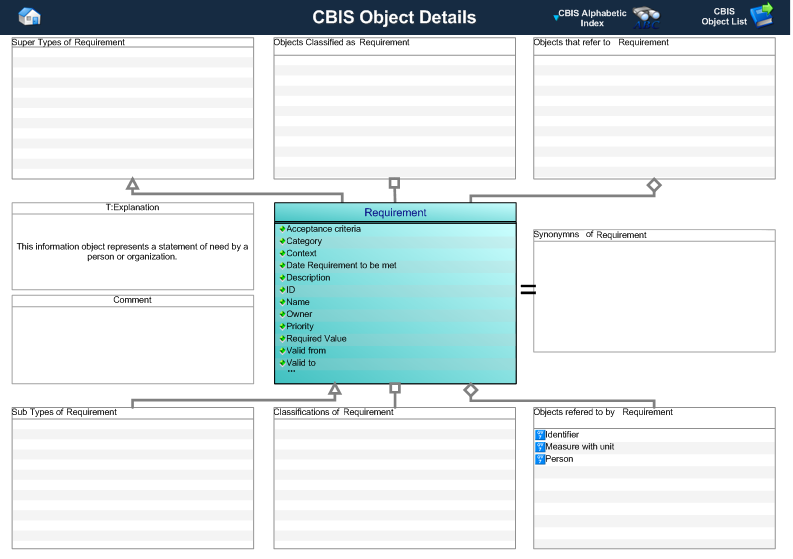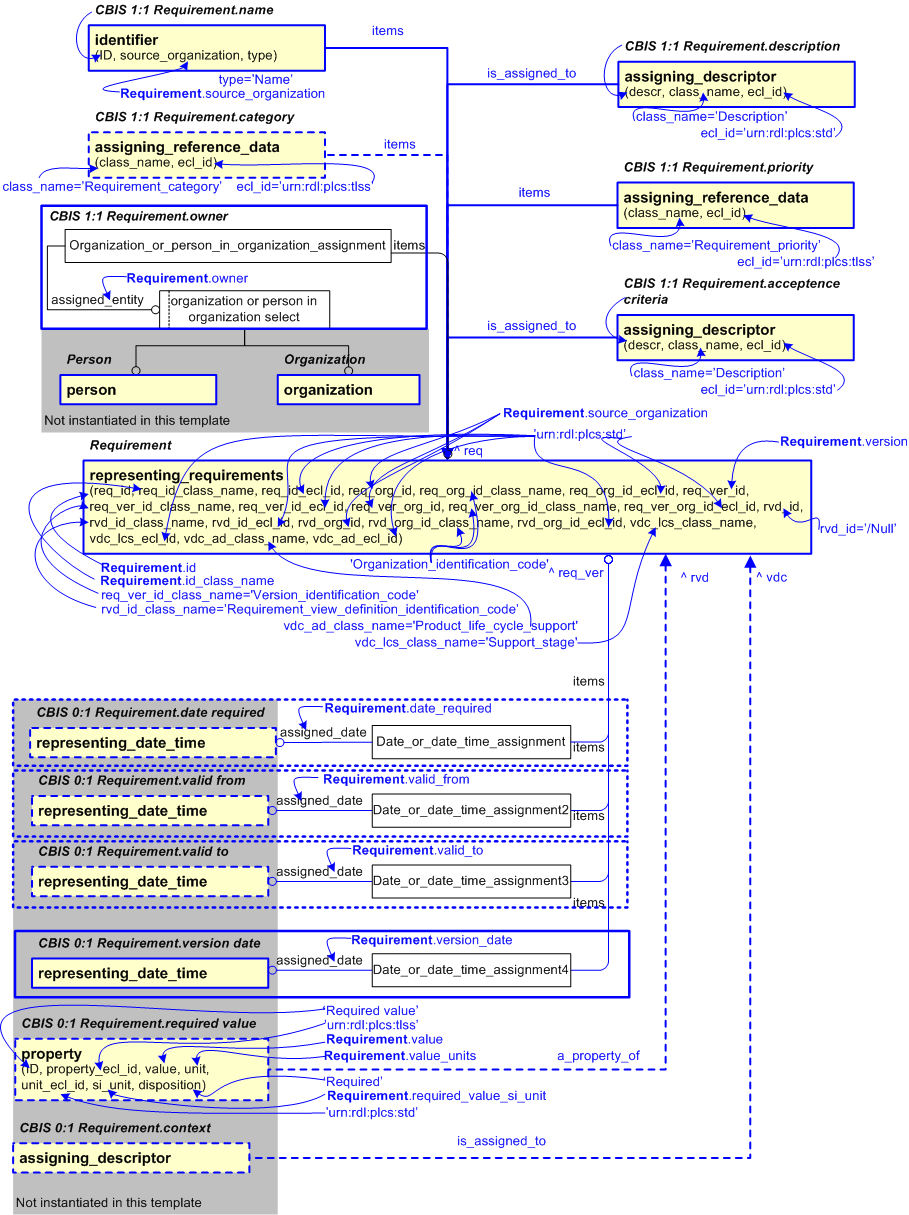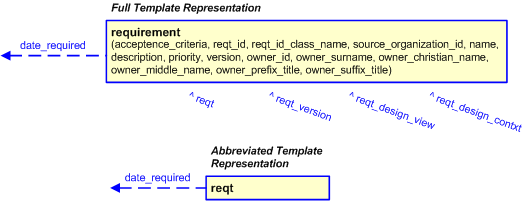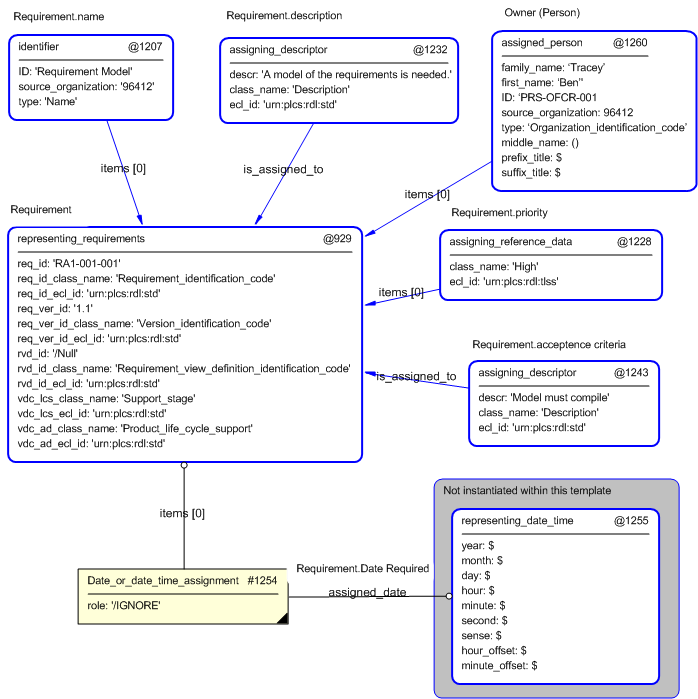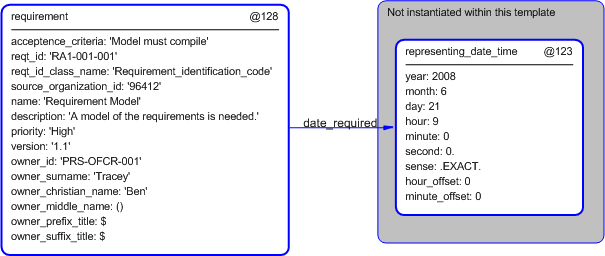Template:— requirement (reqt)
Context:— UK_Defence |
Date: 2009/11/03 10:22:29
Revision: 1.6
|
This section specifies the template requirement.
NOTE
The template has been defined in the context of
UK_Defence.
Refer to the business context for details of related templates.
NOTE
An explanation of a template and the associated instantiation path is
provided in the
Template overview
section.
This template describes how to represent the information requirements of a UK_Defence Requirement object. A Requirement represents
a statement of need by a person or organization.
Requirement information is the means of identifying and documenting a statement of need by a person or organization.
This information object represents the information about a Requirement.
Figure 1 — A MOOD Business Architect representation of the Business Object: Requirement
The attributes of the Requirement object are tabled below.
|
Attribute name
|
Attribute description
|
Attribute type
|
Optionality
|
| Acceptance criteria |
This is the statement of how the solution to the requirement shall be assessed. |
Intrinsic |
Mandatory |
| Category |
This is the category of requirement. |
Intrinsic |
Optional |
| Context |
This is a textual description of the context of requirement. |
Intrinsic |
Optional |
| Date requirement to be met |
This is the date by which the requirement shall be met. |
Intrinsic |
Optional |
| Description |
This is the description that states the requirement. |
Intrinsic |
Mandatory |
| ID |
This is the identifier of the the requirement. |
Identifier |
Mandatory |
| Identifier.id |
This is the value of the id attribute of the Identifier applied to the Requirement. |
intrinsic |
Mandatory |
| Identifier.type |
This attribute is the type associated with the id of the Identifier given to the Requirement. This must be one of the classes
provided.
|
Requirement_identification_code |
Mandatory |
| Identifier.source_organization |
This attribute is the value representing the source organization that provides the id of the Identifier given to the Requirement.
This value is assumed to be a type of Organization_identification_code.
|
Organization_identification_code |
Mandatory |
| Name |
This is the name of the Requirement. There should be at least one name for each Requirement. |
intrinsic |
Mandatory |
| Owner |
This attribute is the value used to represent the owning organization - it is assumed that this is the same as the Organization
that provides the id of the Identifier given to the Requirement.
|
Relationship to Person |
Mandatory |
| Priority |
This is the priority of the requirement. Each Requirement can only have one level of priority assigned. |
intrinsic |
Mandatory |
| Version |
This is the version of the requirement. |
intrinsic |
Mandatory |
| Required value |
This is the required value of the Requirement. |
Intrinsic |
Optional |
| Valid from |
This is the date and time from which the requirement is valid. |
Intrinsic |
Optional |
| Valid to |
This is the date and time to which the requirement is valid. |
Intrinsic |
Optional |
| Version date |
This is the date on which this version of the requirement was defined. |
Intrinsic |
Optional |
Table 1 — Requirement attribute details
The EXPRESS-G diagram in
Figure
2
shows the templates and EXPRESS entities that are required
to represent the template
"requirement".
The text highlighted in blue shows the template parameters.
Figure 2 — An EXPRESS-G representation of the Information model for requirement
The graphic for the template to be used in other EXPRESS-G diagrams
is shown in Figure
3
below.
Figure 3 — The graphical representation of the requirement template
The following input parameters are defined for this template:
category (Default=requirment_category,Type='CLASS', Optional)
The priority level of the Requirement
The requirement's context
The date that the requirements are to be met.
The identifier assigned to a requirement.
The requirement's description
The priority level of the Requirement
The version (identifier) of a requirement.
The owner of the requirement.
The required value assigned to a requirement.
The required value assigned to a requirement.
The following classes and their sub-classes can be used:
Value should be set to true if the unit is a SI base unit defined by ISO, i.e.
kilogram (kg) for Mass,
second (s) for Time,
metre (m) for Displacement,
ampere (A) for Electrical current,
kelvin (K) for Temperature,
mole (mol) for Amount of substance, and
candela (cd) for Luminous intensity. If this is not the case it should be set to false.
Note that the representation of true and false depends on exchange format. In Part 11 (a STEP file) true is
represented by the string ".T.", and false by ".F.", while in Part 28 (XML) they are represented by text strings
"true"
and "false".
The date/time from which the requirements are valid.
The date/time to which the requirements are valid.
The date that the requirements are to be met.
The following reference parameters are defined for this template:
Allow the
Requirement
entity instantiated in this path to be referenced when this template is used.
Note: The
Requirement
entity can be referenced in a template path by:
%^target = $requirement.reqt%
where
target
is the parameter to which the
Requirement
is bound.
Allow the
Requirement_version
entity instantiated in this path to be referenced when this template is used.
%^target = $requirement.reqt_version%
%^target = $requirement.reqt_design_view%
%^target = $requirement.reqt_design_contxt%
The instantiation path shown below specifies the entities that are to be
instantiated by the template.
A description of templates and the syntax for the instantiation path is
provided in the
Templates Help/Information section.
/
representing_requirements(
req_id=@reqt_id,
req_id_class_name='Requirement_identification_code',
req_id_ecl_id='urn:plcs:rdl:std',
req_org_id=@source_organization_id,
req_org_id_class_name='Organization_identification_code',
req_org_id_ecl_id='urn:plcs:rdl:std',
req_ver_id=@version,
req_ver_id_class_name='Version_identification_code',
req_ver_id_ecl_id='urn:plcs:rdl:std',
req_ver_org_id=@source_organization_id,
req_ver_org_id_class_name='Organization_identification_code',
req_ver_org_id_ecl_id='urn:plcs:rdl:std',
rvd_id='/Null',
rvd_id_class_name='Requirement_view_definition_identification_code',
rvd_id_ecl_id='urn:plcs:rdl:std',
rvd_org_id=@source_organization_id,
rvd_org_id_class_name='Organization_identification_code',
rvd_org_id_ecl_id='urn:plcs:rdl:std',
vdc_lcs_class_name='Support_stage',
vdc_lcs_ecl_id='urn:plcs:rdl:std',
vdc_ad_class_name='Product_life_cycle_support',
vdc_ad_ecl_id='urn:plcs:rdl:std')/
-- re-direct the output from the call.. %^reqt = $representing_requirements.req%
%^reqt_version = $representing_requirements.req_ver%
%^reqt_design_view = $representing_requirements.rvd%
%^reqt_design_contxt = $representing_requirements.vdc%
-- Acceptance criteria /
assigning_descriptor(
descr=@acceptance_criteria,
class_name='Acceptance_criteria',
ecl_id='urn:plcs:rdl:uk_defence',
is_assigned_to=^reqt)/
-- [Optional Category] /
assigning_reference_data(
items=^reqt,
class_name=@category,
ecl_id='urn:plcs:rdl:uk_defence')/
-- [Optional Context] /
assigning_descriptor(
descr=@context,
class_name='Context',
ecl_id='urn:plcs:rdl:uk_defence',
is_assigned_to=^reqt_design_contxt)/
-- name /
identifier(
items=^reqt,
ID=@name,
type='Name',
source_organization=@source_organization_id)/
-- description /
assigning_descriptor(
descr=@description,
class_name='Description',
ecl_id='urn:plcs:rdl:uk_defence',
is_assigned_to=^reqt)/
-- owner Organization_or_person_in_organization_assignmentOrganization_or_person_in_organization_assignment.items ->
^reqt_version
Organization_or_person_in_organization_assignment.assigned_entity ->
@owner-- priority /
assigning_reference_data(
items=^reqt,
class_name=@priority,
ecl_id='urn:plcs:rdl:uk_defence')/
-- [Optional date_required] Date_or_date_time_assignmentDate_or_date_time_assignment.role = '/IGNORE'
Date_or_date_time_assignment.items ->
^reqt_version
Date_or_date_time_assignment.assigned_date ->
@date_required-- [Optional required_value, required_value_unit] /
property(
a_property_of=^reqt_design_view,
ID='Required value',
property_ecl_id='urn:plcs:rdl:uk_defence',
value=@required_value,
unit=@required_value_units,
unit_ecl_id='urn:plcs:rdl:std',
si_unit=@required_value_si_unit,
disposition='Required')/
-- [Optional valid_from] Date_or_date_time_assignmentDate_or_date_time_assignment.role = '/IGNORE'
Date_or_date_time_assignment.items ->
^reqt_version
Date_or_date_time_assignment.assigned_date ->
@valid_from-- [Optional valid_to] Date_or_date_time_assignmentDate_or_date_time_assignment.role = '/IGNORE'
Date_or_date_time_assignment.items ->
^reqt_version
Date_or_date_time_assignment.assigned_date ->
@valid_to-- version_date Date_or_date_time_assignmentDate_or_date_time_assignment.role = '/IGNORE'
Date_or_date_time_assignment.items ->
^reqt_version
Date_or_date_time_assignment.assigned_date ->
@version_date
The following entities are instantiated with attributes as specified:
The instance diagram in Figure
4
shows an example of the EXPRESS entities and templates that are instantiated by the template:
/requirement(acceptance_criteria='Model must compile', reqt_id='RA1-001-001', reqt_id_class_name='Requirement_identification_code', source_organization_id='96412', name='Requirement Model ', description='A model of the requirements is needed.', priority='High', version='1.1', owner_id ='PRS-OFCR-001', owner_surname='Tracey', owner_christian_name='Ben', owner_middle_name='', owner_prefix_title='', owner_suffix_title='')/
(an illustration of the consolidated requirement template is shown in
Figure
5 below.)
Figure 4 — Entities instantiated by requirement template
The instance diagram in
Figure
5
shows the graphic symbol for the template that is to be
used in other instance diagrams. The example template is:
/requirement(acceptance_criteria='Model must compile', reqt_id='RA1-001-001', reqt_id_class_name='Requirement_identification_code', source_organization_id='96412', name='Requirement Model ', description='A model of the requirements is needed.', priority='High', version='1.1', owner_id ='PRS-OFCR-001', owner_surname='Tracey', owner_christian_name='Ben', owner_middle_name='', owner_prefix_title='', owner_suffix_title='')/
Figure 5 — Instantiation of requirement template
Characterizations
No common characterizations of the template
requirement
have been identified. However, the ISO 10303-239 EXPRESS model
may enable other assignments to the entities instantiated by the template.
